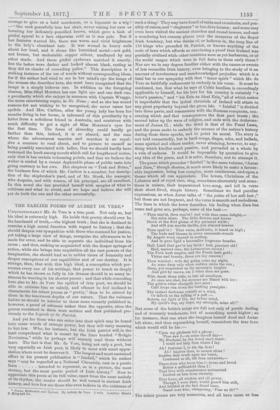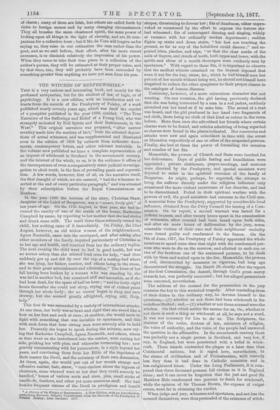THE EARLIER POEMS OF AUBREY DE VERE.*
UNQUESTIONABLY Mr. de Vere is a true poet. Not only so, but his ideal is extremely high. He holds that poetry should ever be the handmaid of truth,—the highest truth ; that she is destined to exercise a high moral function with regard to history ; that she should deepen our sympathies with those who contend for justice, yet taking a large view of things, recognise the allowances to be made for error, and be able to separate the individual from his cause ; and that, making us acquainted with the deeper springs of action, while she brings into requisition all the vast powers of the imagination, she should lead us to nobler views of humanity and deeper conceptions of our capabilities and of our destiny. It is strange, then, that with this high ideal, a conception which per- meates every one of his writings, that power to touch us deeply which he has shown so fully in his dramas should in so many in- stances be wanting in his shorter poems ; and that while conceding here also to Mr. de Vere the epithet of true poet, we should be able to criticise him so calmly, and oftener to feel inclined to characterise his minor poems as "pretty," than to be stirred by them in the innermost depths of our nature. That the volumes before us should be inferior to those more recently published is, however, a proof of advance rather than the opposite, since the poems contained in them were written and first published pre- viously to the Legends of St. Patrick.
And yet for those who can enter into their spirit may be found here some words of strange power, but they will carry meaning to but few. Who, for instance, but the Irish patriot will.in the least comprehend what is meant by the lines headed " Rehgio Novissima," while lie perhaps will scarcely read them without tears. The fact is that Mr. de Vere, being not only a poet, but very especially an Irish poet, is likely to meet with scant appre- ciation where most he deserves it. The longest and most sustained effort in his present publication is " Inisfail," which its author says "may be regarded as a National Chronicle, cast in a poetic form intended to represent, as in a picture, the most stormy, but the most poetic period of Irish history." Now to appreciate this poem at its full value, apart from the mere melody of its rhythm, the reader should be well versed in ancient Irish history, and how few are there who even believe in the existence of
Poems, Meditaltee and Lyrical. By Aubrey de Voce. 2 vols. London ; Henry S. Ming and Co. such a thing I They may have heard of raths and cromlechs, and pos- sibly of cairns, and " cloghauns" or bee-hive houses; and some may even have visited the ancient churches and round towers, and cast a wondering but cursory glance over the treasures of the Royal Irish Academy, but who thinks of, or believes in, the long line of 118 kings who preceded St. Patrick, or knows anything of the code of laws which affords so convincing a proof that Ireland Ma partially civilised while other countries were as yet barbarous, or of the social usages which were in full force in those early times ? Nor are we in any degree familiar either with the names or events of less recondite Irish history, even bringing to the study of it an amount of involuntary and unacknowledged prejudice which is a fatal bar to our spmpathy with that "inner spirit" which Mr. de Vero so faithfully endeavours to embody in his verse. It must be confessed, too, that what he says of Celtic bardism is exceedingly applicable to himself, for his love for his country is certainly " lover's passion," and "his Erin an ideal Erin," all of which makes it improbable that the lyrical chronicle of Ireland will attain to any great popularity beyond the green isle. " Inisfail "is divided into three parts, and commences with the Norman conquests, con- cerning which and thei consequences the firat part treats ; the second takes up the wars of religion, and ends with the dethrone- ment of James II.; while the third is that of the Penal Laws, and the poem seeks to embody the essence of the nation's history during these three epochs, and to point its moral. The story is not told connectedly, but in bard-songs, dirges, odes, and ballads, some spirited and others tender, never attaining, however, to any- thing which kindles much passion, and pervaded as a whole by a vein of sadness. It would be impossible by quotation to give any idea of the poem, and it is safer, therefore, not to attempt it.
The poem which precedes " Inisfail" in the same volume, "Antar and Zara," though shorter, is much more likely to make a favour- able impression, being less complex, more continuous, and upon a theme which all can appreciate. The lovers, Christians of the Lebanon and of royal race, sing, sometimes alternately and some- times in unison, their impassioned love-song, and tell in verse their short-lived, simple history. Sometimes we find peculiar expressions, as when Antar talks of "the palms of her soft feet ;" but these are not frequent, and the verse is smooth and melodious. The lines in which the lover describes his feeling when Zara haa come and gone are, perhaps, some of the best :— " Thou eam'st, thou eam'st ! and with thee came Not mine alone. The little flowers and leaves Shook at the first gleam of thy garment white ; And still yon myrtle thrills, you almond-heaves.
Thou spak'st I That voice, methinks, is heard on high; The buds and blooms in every amaranth-wreath By Angels worn expand in ecstasy,
And in pure light a beavonlier fragrance breathe.
Hail, Land that gav'st her birth! hail, precinct old Hail, ancient race, the Lobanonian crown I The Turk bath empire, and the Frank hath gold ; Virtue and beauty, those are thy renown!
Thou wentest: with thy going came my night, As some deep vale when sudden sinks the sun ; Deep, yet suspended on the mountain heights And girt by snows, sun I when thou art gone.
With death those hills, so late all amethyst,
At once are clad, the streams are filmed with ice; The golden other changeth into mist :
Cold drops run clown the beetling precipice; The instant darkness cometh as a wind,
Or falloth as the falling of a pall :— Return, my light of life, my better mind,
My spirit's clay, my hope, my strength, mine all 1"
But some of the bride's songs are full not only of poetic feeling and of womanly tenderness, but of something much higher ; as for instance, that one when she imagines herself dead and Antar left alone, and then reproaching herself, remembers the true love which would still be his :- "Upon my gladness fell a gloom; Thee saw I—on some far-off day— My Husband, by thy loved one's tomb; I could not help thee where I lay.
Ah I traitress I, to die the first I Ah I hapless thou, to mourn alone ! Sudden that truth upon me burst,
Confessed Bo oft, till then unknown,— There lives who loves him 1—loves and loved
Better a tnillionfold than I!
That love with countenance unremoved
Looked on him from eternity.
That Love, all wisdom and all power,
Though I were dust, would guard him still, And faithful at the last dread hour, Stand near hizn, whispering, 'Fear no ill l" The minor poems are very numerous, and all have more or leas
of charm ; many of them are Irish, but others are called forth by visits to foreign scenes and by many changing circumstances. They all breathe the same chastened spirit, the same power of looking upon all things in the light of eternity, and are fit com- panions for a reflective hour ; but if Mr. de Yore will forgive us for saying so, they raise in our estimation the man rather than the poet, and as we said before, their effect, after hie more recent successes, is to diminish relatively the impression of his power. When they come to take their true place in a collection of the author's poems, they will be estimated at their proper value, and by that time, too, they will probably have been succeeded by something greater than anything we have yet seen from his pen.































 Previous page
Previous page